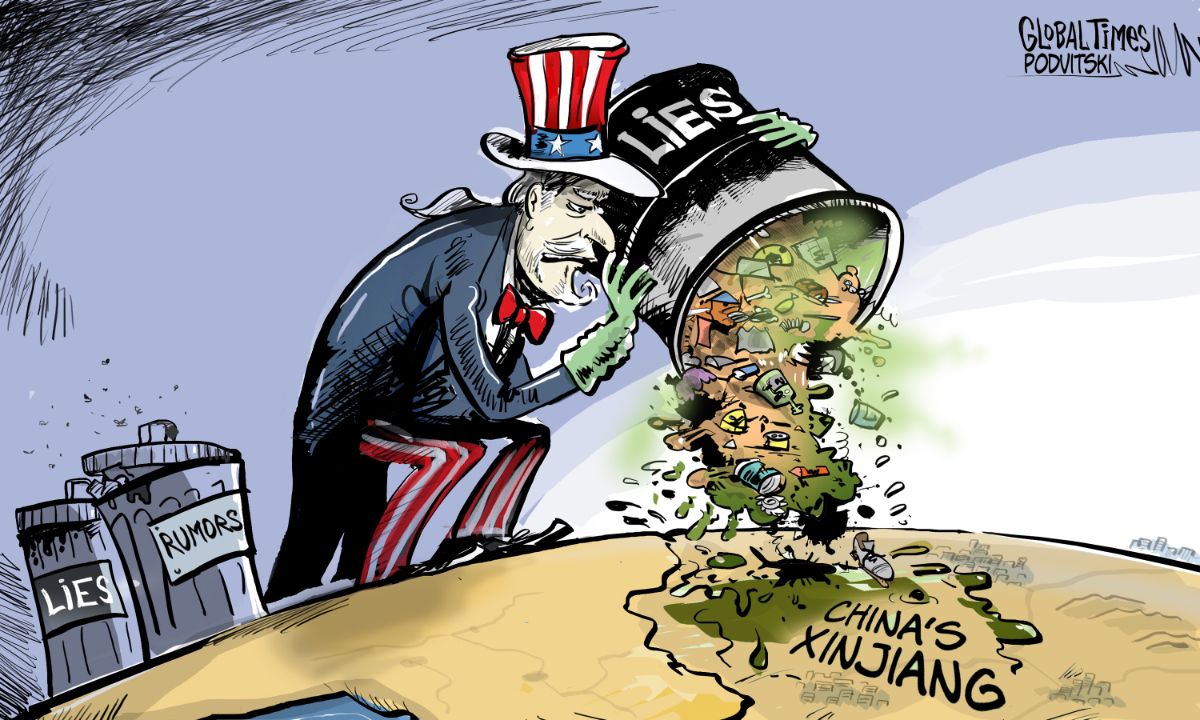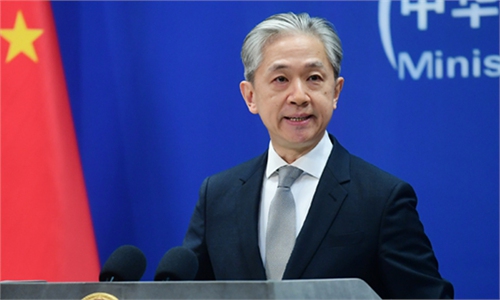US religious freedom report disregards facts, full of bias: FM
Smear campaign to justify political besiegement, economic sanctions

Slandering Xinjiang -- the new normal of the "empire of lies" Illustration: Vitaly Podvitski
The US remarks lack factual basis and distort China's ethnic and religious policies, Chinese Foreign Ministry spokesperson Wang Wenbin commented Tuesday on the US State Department's so-called 2022 Report on International Religious Freedom.
"We do not accept it and categorically reject it," Wang said at a routine press briefing on Tuesday, adding that "the US has kept peddling disinformation about Xinjiang to use it to contain China and find a pretext to keep China down. The international community can see this clearly."
"We urge the US to face up to and reflect on its own problems, respect the facts and truth, stop applying double standard, and stop using the so-called human rights, religious and ethnic issues to meddle in China's internal affairs. The attempt of using the so-called human rights and religious issues to hold back China's development is doomed to fail," Wang said.
Wang's response came after the US State Department released its annual religious report which alleges religious violations in China. Secretary of State Antony Blinken repeated the old accusations of "genocide" and "crimes against humanity" without giving robust proof.
The US Commission on International Religious Freedom in its 2023 report released on May 1 listed China as a country of particular concern.
Jia Chunyang, an expert at the China Institutes of Contemporary International Relations, told the Global Times on Tuesday that from "forced labor" to "genocide," the US aims to keep Xinjiang-related affairs to the forefront in the international sphere to use Xinjiang as a lever to carry out a smear campaign against China and mobilize other countries to follow suit.
By attacking China's religious and ethnicity policies and human rights, the US wants to justify its political besiegement and economic sanctions against China when the two countries are in a major power rivalry, Jia said.
Li Haidong, a professor at the Institute of International Relations at the China Foreign Affairs University, told the Global Times on Tuesday that one of the US' purposes to release the report before the Group of Seven summit in Japan that starts on Friday is to continuously hype the topics and remind its allies not to forget to play the "religion and Xinjiang card." It serves the US' goal of suppressing and marginalizing China, the expert said.
But the US did not convene as much support as it expected from the world, and has overestimated its own strength when it dreams of an all-out crackdown on China, including political isolation and economic sanctions.
Meanwhile, it underestimates Chinese public support for our own religious and other policies, Li said.
Wang said at Tuesday's press briefing that there are nearly 200 million religious believers, over 380,000 clerical personnel, about 5,500 religious groups and over 140,000 places of worship registered for religious activities in China, including about 24,000 mosques in Xinjiang alone.
During the past 60-plus years since the Xinjiang Uyghur Autonomous Region was established, the region's economy has grown 160 times. Its Uyghur population expanded from 2.2 million to about 12 million, and average life expectancy there increased from 30 to 74.7 years.
Some 2,000 officials, religious personnel and reporters from more than 100 countries and international organizations have visited Xinjiang in recent years, speaking highly of its social stability and prosperity, understanding the counter-terrorism and deradicalization achievements, Wang said.
Jia noted a contrast that countries criticized in the report were those of different ideologies, systems and development paths from the US, even including India which the US has been wooing in recent years, while those praised in the report are countries in the same "camp of values."
This again demonstrates the US' human rights diplomacy and the use of ideology to differentiate "friends" and "enemies." If a country does a favor for the US, it would be rewarded by favorable words in the report, Jia said.
The US is actually abusing the concepts of freedom and human rights to consolidate its hegemony, analysts said, predicting that such attacks against China will continue as long as the US sticks to its "rivalry with China."



